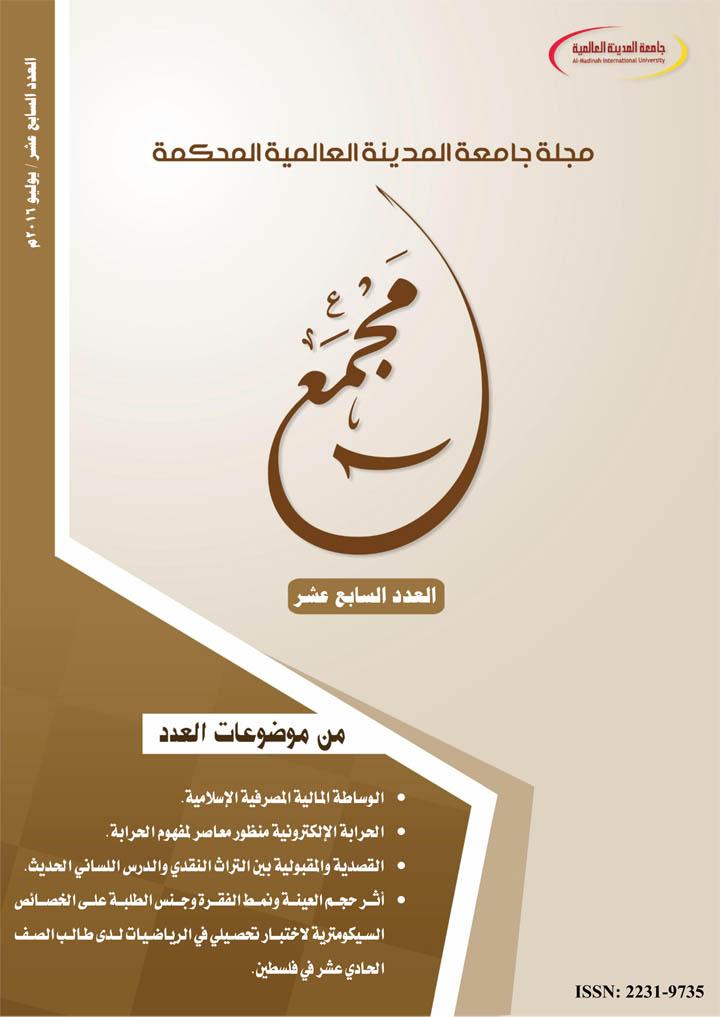التلقي ما بين النظرية الغربية الحديثة والتراث النقدي البلاغي في العصر العباسي (132هـ ــــــــ 656هـ)
##plugins.themes.bootstrap3.article.main##
الملخص
مصطلح التلقي واحد من ركائز نظرية التلقي، وهي تعد من أبرز النظريات الغربية، التي شاعت في الحركة النقدية الغربية الحديثة، ثم انتقلت لاحقاً إلى النقد العربي؛ بسبب الاحتكاك الثقافي. وأحدثت هذه النظرية تحولاً في الاهتمام من ثنائية الكاتب والنص إلى تحليل العلاقة بين النص والقارئ، وكان لها تأثيرها القوي على النقد العربي، بعد انتقالها إلى الوطن العربي، وأصبحت إشكالية دفعتنا إلى بحثها في هذه الدراسة.
وجاءت هذه الدراسة لقراءة التراث النَّقدي البلاغي برؤيةٍ منهجيَّة، ترتكز على منهج روَّاد نظرية التلقي الغربيين في جمالية التلقي، التي تميِّز بين القصديَّة والتأويل، وتمنح المتلقِّي دوراً بارزاً في تأويل النصوص وتقويمها، وتهدف هذه الدراسة إلى الآتي:
- التأصيل لنظرية التلقي الغربية، والبحث عن جذورها في التراث النقدي البلاغي العربي.
- إحياء وبعث موروثنا النقدي البلاغي العربي، ومواكبته على المستويين النظري والتطبيقي.
- تحديد الموقف من سلطة المتلقي في تأويل النص القرآني وتفسيره.
وبعد التعريف المختصر بمصطلح التلقي لغة واصطلاحاً، وعرض نشأة وتطور نظرية التلقي مع التفصيل في مفاهيمها وركائزها، والتأصيل لظاهرة التلقي في تراثنا النقدي البلاغي، أوصلتنا هذه الدراسة إلى نتائج أبرزها:
- إنَّ القارئ الذي يملأ فراغات النص هو جوهر التلقي.
- أجمع الغربيون والنقَّاد البلاغيون العباسيون على أن قراءة العمل الأدبي لا تتم إلا بالتفاعل بين بنيته النصيَّة ومُتَلَقِيهِ.
- إن نقل سلطة تفسير النص للقارئ ــــ عند الغربيين ـــ تشكِّل خطراً يتسبب في فوضى في التفسير، فوضعوا له ضوابط تتمثَّل في القصدية وأفق التوقعات.
- إن الإعجاز القرآني عند النقاد البلاغيين في العصر العباسي يقتضي ثبات المعاني، وعدم تجاوز القارئ الحدود في التأويل الذي يؤدي إلى ابتكار المعاني، وينحصر دوره في استخراج المعاني التي وضعها المتكلم.
- إن الاهتمام بالتلقي والمتلقي في التراث النقدي والبلاغي لم يصل إلى المنهجية المطلوبة التي تؤسس لدور القارئ في التأويل والتقييم للنصوص.
The term reception is considered as one of the pillars of the reception theory which is thought out as one of the most prominent modern western theories. This theory was common in the modern western critical movement. Then, later was passed to Arabic critique because of the cultural contact. This theory caused a shift in attention from the writer and the text’s dualism to the analysis of the relationship between the text and the reader, and it had a strong impact on the Arab criticism, after its transference to the Arab world, and become a problem was led us to study in this research.
This study came to read the rhetorical critical heritage through a methodical approach based on the Western pioneers of the reception theory in the aesthetic reception that distinguish between interpretation and what is intentional. This theory gives the receiver a prominent role in the interpretation and evaluation of texts. This study aims to:
- Fundamentalism of the Western reception theory, and search for its roots in the Arab critical and rhetorical heritage.
- Revival and resurrection of our Arabic critical and rhetorical heritage, and keep pace with both theoretical and practical levels.
- Determination of the position of the receiver authority in the interpretation and explication of the Quranic text.
After identifying the term briefly as a meaning and a convention, then displaying the up growth and evolution of the reception theory, after that, giving details for its concepts and pillars, and establishing the origin of the reception phenomenon in our critical rhetorical heritage, the study has brought us to the following:
- The reader who fills the gaps of the text is the essence of the receiving.
- The meaning is the final outcome of the interaction between the structure of the literal work understanding, and that the transference of the authority of interpretation of the text to the reader is a danger which causes a confusion of the interpretation, so, they set intentionality and anticipations horizon criteria control to it.
- The Qur'an’s miracle requires consistency of meanings, and the reader shouldn’t exceed the borders of hermeneutics which leads to the innovation of meanings, and limited its role in the extraction of the meanings that set by the speaker.
- The interest in the reception and the receiver in the critical and rhetoric heritage didn’t reach the required methodology that establishes the role of the reader in the interpretation and evaluation of the texts.
The opening words: Reader, Construct meaning, Forecast horizon, Arabic critique heritage.

